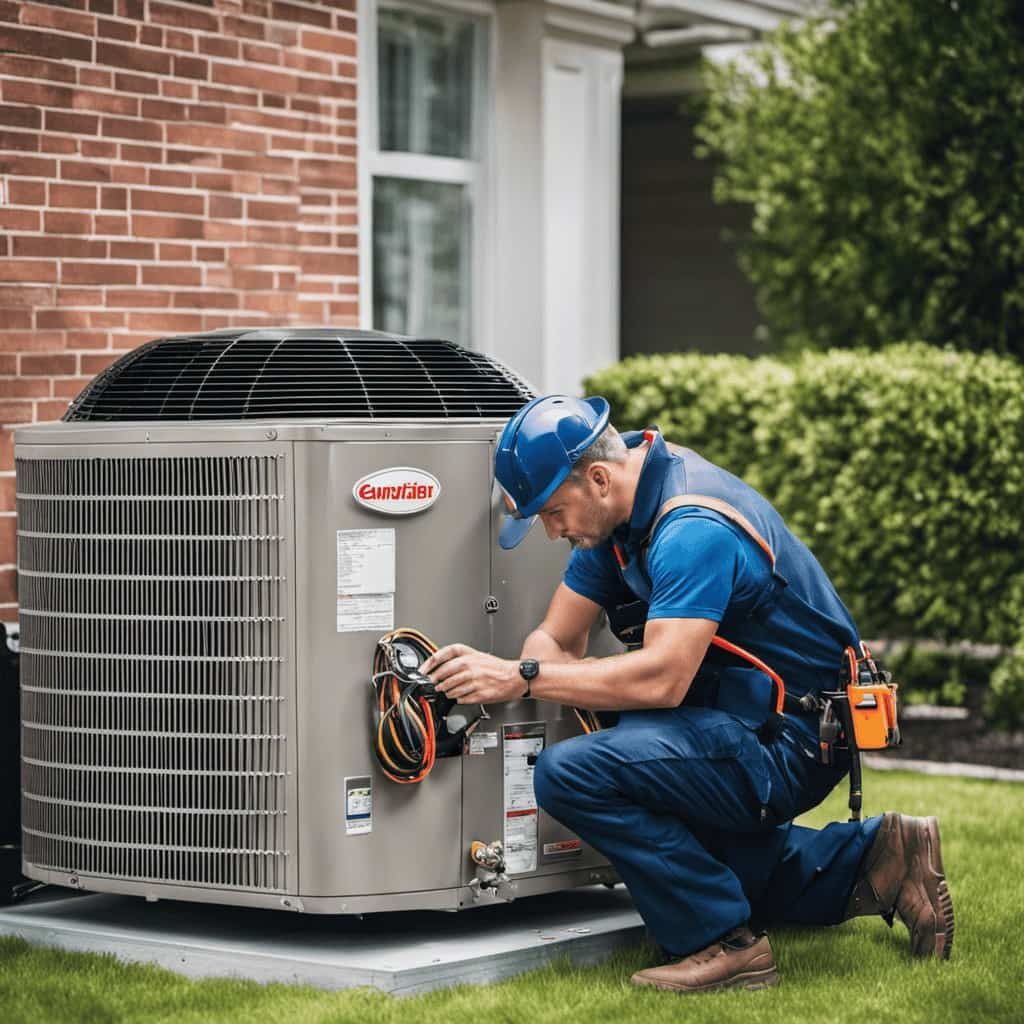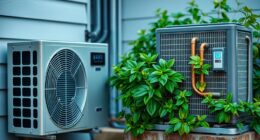At our company, we are dedicated to discovering energy-saving solutions for our clients. That’s why we are thrilled to share with you this article on understanding the effectiveness of geothermal heat pumps.
By understanding how these pumps work and the key factors that affect their efficiency, you can make informed decisions to maximize your energy savings.
Join us as we delve into the world of geothermal heat pumps and uncover the secrets to a more sustainable and cost-effective heating and cooling system.
Key Takeaways
- Geothermal heat pumps utilize the natural heat from the Earth to provide efficient heating and cooling solutions.
- Proper sizing, design, and regular maintenance are crucial for optimizing the performance and energy efficiency of geothermal heat pump systems.
- Geothermal heat pumps offer significant energy savings over time, despite the higher initial installation cost.
- Maximizing energy savings with geothermal heat pumps can be achieved through proper system design, regular maintenance, and incorporating additional energy-saving measures such as insulation, programmable thermostats, zoning systems, passive solar design, and taking advantage of available tax credits and incentives.
Understanding Geothermal Heat Pumps
We can gain a better understanding of geothermal heat pumps by exploring their components and how they function.

Geothermal heat pump technology utilizes the natural heat from the Earth to provide efficient heating and cooling solutions for homes and buildings. These systems consist of three main components: the ground loop, the heat pump unit, and the distribution system.
The ground loop consists of a series of pipes buried underground that circulate a fluid to absorb or release heat. The heat pump unit extracts heat from the ground loop fluid and transfers it to the distribution system, which then distributes the heated or cooled air throughout the building.
The benefits of geothermal heating include energy efficiency, cost savings, and environmental sustainability. By harnessing the Earth’s natural heat, geothermal heat pumps provide a reliable and eco-friendly solution for serving others and creating a comfortable living environment.
How Geothermal Heat Pumps Work
To understand how geothermal heat pumps work, we need to explore the process of transferring heat from the ground to provide efficient heating and cooling for buildings.

Geothermal heat pump technology utilizes the constant temperature of the earth to regulate the temperature inside a building. The installation of a geothermal heat pump involves burying pipes, called loops, underground.
These loops are filled with a mixture of water and antifreeze, which absorbs the heat from the ground. The fluid is then pumped into the heat pump unit, where the heat is extracted and transferred to the building’s heating system.
In the summer, the process is reversed, and the heat is removed from the building and transferred back into the ground.
This efficient process allows geothermal heat pumps to provide reliable and sustainable heating and cooling solutions for homes and businesses.

Key Factors Affecting Geothermal Heat Pump Efficiency
One of the key factors affecting geothermal heat pump efficiency is the proper sizing and design of the system. A well-designed and properly sized geothermal heat pump system ensures optimal performance and energy efficiency. In addition to system design, regular geothermal heat pump maintenance is crucial for maintaining efficiency. Regular maintenance includes cleaning or replacing air filters, checking and lubricating fan motors, inspecting refrigerant levels, and ensuring proper airflow. Neglecting maintenance can lead to reduced efficiency and increased energy consumption. Another factor that affects geothermal heat pump efficiency is the initial cost of installation. While geothermal heat pump systems have higher upfront costs compared to conventional heating and cooling systems, they can provide significant energy savings over time, resulting in lower overall operating costs. Evaluating the performance of geothermal heat pumps is important to ensure that the system continues to operate efficiently and cost-effectively.
| Key Factors Affecting Geothermal Heat Pump Efficiency |
|---|
| Proper sizing and design of the system |
| Regular geothermal heat pump maintenance |
| Initial cost of installation |
In the next section, we will discuss how to evaluate the performance of geothermal heat pumps to ensure optimal efficiency.
Evaluating the Performance of Geothermal Heat Pumps
When evaluating the performance of geothermal heat pumps, it’s important to assess their energy efficiency and overall effectiveness in heating and cooling a space. Here are three key factors to consider when evaluating the performance and measuring the effectiveness of geothermal heat pumps:
-
Coefficient of Performance (COP): This metric measures the ratio of heat output to the amount of electricity input. A higher COP indicates greater efficiency and cost-effectiveness.

-
Heating and Cooling Capacity: It’s essential to evaluate the heat pump’s ability to meet the heating and cooling demands of the space. This includes assessing its capacity to maintain a comfortable temperature and proper ventilation.
-
System Reliability and Durability: Evaluating the performance of geothermal heat pumps also involves considering their reliability and durability. This includes examining the lifespan, maintenance requirements, and warranty of the system.
By carefully evaluating these factors, one can make an informed decision about the performance and effectiveness of geothermal heat pumps.
Transitioning into the subsequent section about maximizing energy savings with geothermal heat pumps, let’s explore how to further optimize their performance.

Maximizing Energy Savings With Geothermal Heat Pumps
By optimizing our usage and implementing energy-efficient practices, we can maximize the energy savings achieved with geothermal heat pumps.
One way to achieve this is through proper geothermal heat pump installation. It’s important to ensure that the system is correctly sized, designed, and installed by qualified professionals. This will help to maximize the system’s efficiency and prevent any potential energy losses.
Additionally, regular geothermal heat pump maintenance is crucial for optimal performance and energy savings. This includes cleaning or replacing air filters, inspecting and cleaning the indoor and outdoor units, and checking for any leaks or malfunctions.
Frequently Asked Questions
Are Geothermal Heat Pumps Suitable for Both Residential and Commercial Buildings?
Yes, geothermal heat pumps are suitable for both residential and commercial buildings. They provide efficient heating and cooling, reducing energy consumption and costs. Additionally, they have a minimal environmental impact, making them a sustainable choice for serving others.

How Much Does a Geothermal Heat Pump Installation Cost?
Installing a geothermal heat pump can cost between $10,000 and $30,000. However, the long-term benefits outweigh the initial investment. Geothermal heat pump efficiency can reduce energy consumption by up to 70%, resulting in significant savings on utility bills.
Can a Geothermal Heat Pump Be Installed in an Existing Building, or Is It Only Suitable for New Constructions?
Yes, a geothermal heat pump can be installed in an existing building. Retrofitting older buildings with geothermal heat pumps offers numerous benefits, such as energy efficiency, cost savings, and reduced environmental impact.
Are There Any Government Incentives or Tax Credits Available for Installing a Geothermal Heat Pump?
Yes, there are government incentives and tax credits available for installing a geothermal heat pump. It’s great to see our hard-earned money being used to support environmentally friendly and energy-efficient solutions.
How Long Does a Geothermal Heat Pump System Typically Last Before It Needs to Be Replaced or Repaired?
Geothermal heat pump systems can typically last for 20-25 years before needing replacement or repairs. Common issues include refrigerant leaks, electrical problems, and faulty components. Regular maintenance can help extend the lifespan.

Conclusion
In conclusion, understanding how geothermal heat pumps work and the key factors that affect their efficiency is crucial in maximizing energy savings.
By evaluating their performance and utilizing proper maintenance and insulation techniques, we can harness the full potential of geothermal heat pumps.
So, let’s take advantage of this efficient and sustainable technology to create a greener and more cost-effective future for our homes and the environment.









